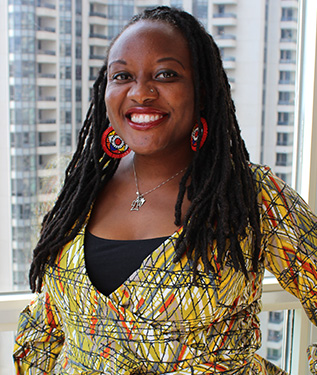
Oyemolade Osibodu, an assistant professor in the Faculty of Education at York University, conducted a pilot study to help her understand the mathematics experiences of Black youth in Greater Toronto Area (GTA) high schools and the results confirmed a lack of diversity in mathematics educators.
By Elaine Smith

Growing up Black in Nigeria, race was never an issue at school for Oyemolade Osibodu, an assistant professor in the Faculty of Education. If she had to prove herself occasionally, it was likely because of gender. However, her experience teaching in North America has shown her that Black youth have a very different experience, particularly in mathematics.
This year, Osibodu, whose specialty is math education, conducted a pilot study to help her understand the mathematics experiences of Black youth in GTA high schools.
“Math is not a neutral enterprise,” Osibodu said, “and it’s not just about these Black students learning math. I focused on the sociocultural and sociopolitical experience, looking at the extra layer it adds to the enterprise and what effect that has.
“The Black community in the GTA is very heterogeneous and many of the students are first-generation Canadians. I looked to see what research existed in the Canadian context unlike the United States, but I found no qualitative studies about Black youth as related to mathematics. It needs to be done and it mattered to me.”
Osibodu selected eight high school students from schools in Toronto, Durham Region and York Region for her qualitative study and explored their high school math experiences. More than half of them loved math and were successful with it, but Osibodu wanted to see what other factors were at play.
“Many of them felt that other students were surprised to see them in academic math classes and succeeding with the work,” she said. “I don’t know how we fix this.”
Even in the diverse Toronto District School Board (TDSB), the student was one of the few Black or mixed-race students on the academic track at her school and felt the pressure to prove she belonged.
“One other thing was clear,” said Osibodu. “Of the eight students, none had ever had a Black math teacher and only the TDSB student had had Black teachers in any subject.”
To understand the Black experience more thoroughly, Osibodu has applied for a three-year grant from the Social Sciences and Humanities Research Council (SSHRC) to do a larger longitudinal study following students in Grades 9, 10 and 11 to try to understand the impact of race and power on Black learners and how different experiences shape their math identities.
“My work will combine math with social justice,” she said. “I want to use math as an avenue to talk about social issues, though the students I spoke with weren’t sure it was possible. Many math classes are still very quiet; the teacher asks questions and the students answer. But they were all keen to see what it could look like.”
Osibodu knows there is a way to insert context into math – in looking at housing prices, the inequity in loan approvals and the financial impacts of gentrification, for example.
The project is designed to run throughout the year and would include “interesting math activities” in the summer, giving the students “a space where we talk, rather than do worksheets” and one that will allow them to “make sense of the world through a math lens.”
Osibodu is the winner of the EdCan Network’s 2021 Pat Clifford Award, an honour that recognizes Canada’s emerging education researchers. She’s holding her breath while waiting to see if SSHRC recognizes the importance of her research by approving her grant.
